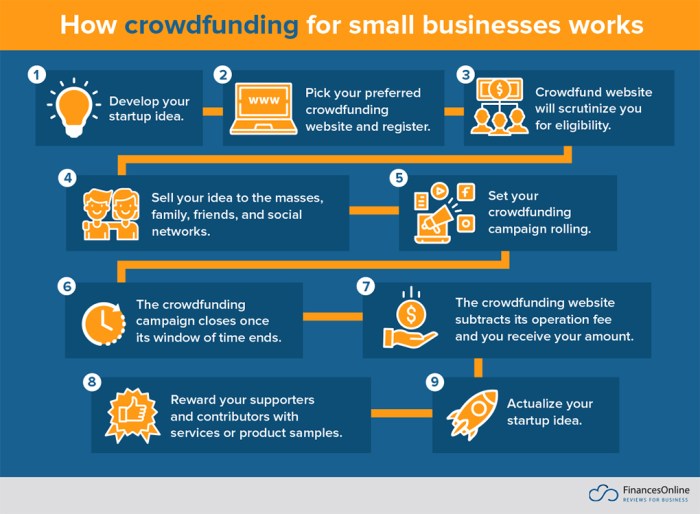Starting with Startup business financing tips, this paragraph aims to grab the reader’s attention and provide a sneak peek into the world of financing for startups. It sets the stage for an informative and engaging discussion ahead.
The following paragraphs will delve deeper into the importance of financing, various options available, creating a financial plan, and building investor relationships for startup success.
Importance of Startup Business Financing: Startup Business Financing Tips

Securing proper financing is crucial for the success of a startup. Adequate funding can provide the necessary resources for growth and sustainability, allowing the business to scale and expand its operations effectively.
Fueling Growth and Sustainability
Proper financing enables startups to invest in research and development, marketing, hiring top talent, and expanding into new markets. This financial support fuels growth by allowing the business to innovate, improve products or services, and reach a wider customer base. Sustainable growth is achievable when the startup has the financial stability to weather challenges and capitalize on opportunities.
Potential Challenges Without Adequate Financing
Startups without sufficient funding may struggle to cover operational costs, invest in necessary resources, or withstand unexpected setbacks. This lack of financial support can hinder growth potential, limit innovation, and even lead to business failure. Without proper financing, startups may find it challenging to compete in the market and achieve long-term success.
Successful Startups with Smart Financing Strategies
Examples of successful startups that attribute part of their success to smart financing strategies include Airbnb, Uber, and Slack. These companies secured strategic investments, managed their finances effectively, and made calculated decisions to ensure sustainable growth. By leveraging their funding wisely, these startups were able to disrupt industries, expand globally, and achieve significant market share.
Types of Startup Financing Options
Startup businesses have various financing options available to them to secure the necessary capital for growth and expansion. It is essential for entrepreneurs to understand the different sources of funding and their pros and cons to make informed decisions for their startup’s financial health.
Bootstrapping, Startup business financing tips
Bootstrapping is a common way for entrepreneurs to finance their startups using personal savings or revenue generated by the business. While bootstrapping allows founders to maintain full control over their company and avoid debt, it may limit the growth potential due to the lack of external funding.
Angel Investors
Angel investors are individuals who provide capital to startups in exchange for ownership equity or convertible debt. They often offer mentorship and industry connections in addition to funding. Angel investors can be a valuable source of funding for early-stage startups looking to scale quickly.
Venture Capital
Venture capital firms invest in startups with high growth potential in exchange for equity ownership. They typically provide larger sums of funding compared to angel investors but often require a significant ownership stake in the company. Venture capital is suitable for startups aiming for rapid expansion and scalability.
Crowdfunding
Crowdfunding platforms allow startups to raise funds from a large number of individuals, often in exchange for early access to products or other rewards. Crowdfunding can be an effective way to validate product ideas, build a community of supporters, and raise capital without giving up equity. However, it requires a strong marketing strategy and may not be suitable for all types of businesses.
Real-Life Examples
– Airbnb: Airbnb initially bootstrapped its operations by renting out air mattresses in their living room to cover expenses before attracting angel investors and venture capital funding.
– Oculus VR: Oculus VR raised over $2.4 million through a crowdfunding campaign on Kickstarter before being acquired by Facebook for $2 billion.
Developing a Financial Plan

Creating a detailed financial plan is crucial for the success of a startup. It helps in setting clear financial goals, managing resources effectively, and attracting potential investors who want to see a solid plan in place.
Importance of a Comprehensive Financial Plan
- Start by outlining your startup’s financial goals and objectives. This will provide a roadmap for your business and help you stay on track.
- Develop revenue projections based on market research and realistic assumptions. This will give you an idea of how much income your business can generate.
- Forecast expenses accurately, including fixed costs like rent and utilities, as well as variable costs like marketing and supplies.
- Manage cash flow by monitoring incoming and outgoing funds to ensure your business has enough liquidity to operate smoothly.
Key Components of a Solid Financial Plan
- Executive Summary: Provide a brief overview of your financial plan, highlighting key points and objectives.
- Revenue Projections: Estimate your expected revenue based on sales forecasts and market analysis.
- Expense Forecasts: Break down your expected costs, including both fixed and variable expenses.
- Cash Flow Statement: Track the flow of cash in and out of your business to ensure financial stability.
Attracting Investors with a Financial Plan
- Investors look for startups with a clear financial plan that demonstrates a solid understanding of the business and its potential for growth.
- A detailed financial plan can instill confidence in investors and increase the likelihood of securing funding for your startup.
Adjusting and Revising the Financial Plan
- Regularly review and update your financial plan to reflect changes in the market, business environment, or internal operations.
- Be flexible and willing to adjust your plan as needed to adapt to new opportunities or challenges that arise.
- Consult with financial advisors or mentors to get feedback on your financial plan and make necessary adjustments for continued success.
Building Investor Relationships

Building strong relationships with investors is crucial for the success of a startup. Investors not only provide funding but also offer valuable guidance, expertise, and connections that can help the business grow. Here are some tips on how startups can effectively pitch their business ideas to potential investors and maintain transparency and trust throughout the funding process.
Tips for Pitching to Investors
- Clearly articulate your business idea, target market, and unique selling proposition.
- Demonstrate a solid understanding of the market landscape and your competition.
- Showcase a strong and experienced team that can execute the business plan effectively.
- Highlight your traction, whether it’s in the form of sales, partnerships, or user growth.
- Be prepared to answer tough questions and address any potential risks or challenges.
Strategies for Maintaining Transparency and Trust
- Provide regular updates on the company’s progress and financial performance.
- Be honest about setbacks or challenges and how you plan to overcome them.
- Involve investors in key decision-making processes and seek their input and feedback.
- Set realistic expectations and communicate openly about the company’s goals and milestones.
- Follow through on commitments and deliver results to build credibility and trust.
Examples of Successful Startups with Strong Investor Relationships
One notable example is Airbnb, which cultivated strong relationships with investors like Sequoia Capital and Andreessen Horowitz. These investors not only provided funding but also valuable advice and connections that helped Airbnb become a global success. Another example is Uber, which secured funding from investors like Benchmark and Google Ventures, who played a key role in the company’s rapid growth and expansion.
In conclusion, understanding the crucial role of financing, exploring different options, creating a solid financial plan, and nurturing investor relationships are key elements in the journey of a successful startup.
When it comes to maximizing returns, many investors turn to high-yield business investment funds. These funds offer the potential for significant profits, making them a popular choice among those looking to grow their wealth quickly.
For savvy business investors, taking advantage of tax deductions can make a big difference in their overall financial strategy. By understanding the various deductions available, investors can minimize their tax burden and keep more of their hard-earned money.
Entrepreneurs seeking small business funding sources have a variety of options to choose from. Whether it’s through traditional bank loans, angel investors, or crowdfunding platforms, finding the right funding source is crucial for the success of any small business venture.




